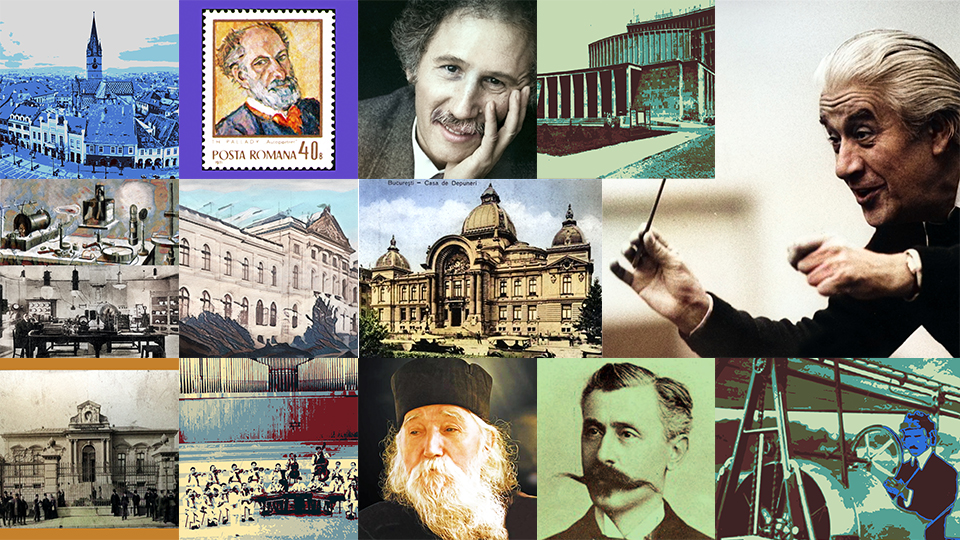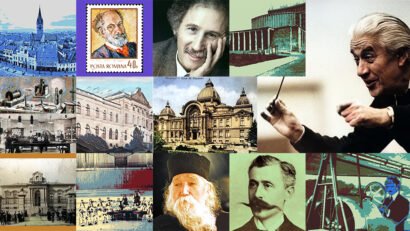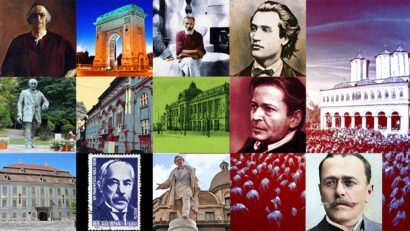Lucian Blaga, the diplomat
In the Romanian culture, the name of Lucian Blaga is associated with excellence.

Steliu Lambru, 11.10.2025, 14:15
In the Romanian culture, the name of Lucian Blaga is associated with excellence. His work is studied in high schools, as his name and creation are found in the pages of Romanian language and literature textbooks. “I will not crush the world’s corolla of wonders” is among his most popular poems, and the universe of his creation is considered one of great strength.
Lucian Blaga was born in 1895 in Alba County, then part of Austro-Hungary, and died in 1961 in Cluj. He studied theology in Sibiu and biology and philosophy in Vienna, where he also defended his doctoral thesis in philosophy in 1920. He made his debut as a writer in 1919, at the age of 26, influenced by expressionism. He wrote poetry and drama and was active in the cultural press. A refugee from Cluj to Sibiu after 1940, the year Northern Transylvania was ceded to Hungary, during the war years he was the founder of the Sibiu Literary Circle, of modernist orientation. In Sibiu he was also a professor at the university that today bears his name. In 1948, the education reform law issued by the communist regime led to Blaga’s removal from the chair. He returned to Cluj and was a librarian at the local branch of the Academy of the Romanian People’s Republic. In parallel with his work as a librarian and researcher at the Institute of Philosophy of the Academy, he made translations from the German literature. He was married to Cornelia Brediceanu, daughter of Coriolan Brediceanu, a Romanian lawyer and politician from Banat, with whom he had a daughter, Dorli.
Lucian Blaga was also a diplomat. In 1926 he chose to represent the Romanian state abroad, his culture and abilities recommending him for this purpose. He held positions as cultural attaché at the Romanian legations in Warsaw, Prague, Lisbon, Bern and Vienna. He was also attaché and press advisor in Warsaw, Prague, Bern, between 1926 and 1936, and in Vienna between 1936 and 1937. Also between 1936 and 1937 he held the position of undersecretary of state in the Ministry of Foreign Affairs in the government led by another writer, the poet Octavian Goga. The highest diplomatic position held by Blaga was that of Minister Plenipotentiary, the equivalent of today’s ambassador, of Romania to Portugal between 1938 and 1939. In 1939, the personal authority regime of King Carol II removed Blaga from diplomacy, as he was considered too close to Germany and to the ideas of the fascist Iron Guard party. He was supported by his wife in choosing a diplomatic career and she followed him to Romanian missions abroad and helped him prepare reports. Their daughter was born in 1930 in Bern, where Blaga was a press attaché.
In the archive of the Oral History Center of the Romanian Radio Broadcasting Corporation there is an interview with the lawyer, translator and journalist Horia Stanca from 2000. He recalled that among his acquaintances in the cultural world of the interwar period was also Lucian Blaga: “I met Blaga without cultivating a friendship with him because Blaga was always abroad. He was first a press attaché, then he was also a plenipotentiary minister, and lately he had been a plenipotentiary minister in Lisbon. When he appeared as a university professor in Cluj, we were no longer in Cluj, we had already been moved to Bucharest. I then left for Berlin, so I only got to know him during the holidays when I went home to Sibiu. He met frequently with my brother, Radu. Blaga cultivated him as a kind of successor to him, Blaga had taken Radu as an assistant. In the end, however, Radu dealt more with theater and his poems.”
Horia Stanca met Lucian Blaga several times and the meetings were memorable. But not because of Blaga’s intellectual scope, but because of the writer’s reserved character: “I met Blaga on a few occasions. Once I met him at a theater, one evening, when there were more people there and of course it was a very cheerful, very interesting society, but where you couldn’t talk and have discussions. We never had any discussions anyway. Then I met him one day, being together with my brother, Radu, in Sibiu, on the boulevard, and we sat down at a table to have a beer. Two more friends of my brother’s joined us and we stayed there for at least two hours telling stories. But Blaga didn’t talk at all. And I said to Radu afterwards: <Oh, but how come Blaga didn’t say anything?> And Radu says: <He never says anything. He just sits and listens.> I say: <Well, if we didn’t talk, we’d just be bored there>. Blaga wasn’t a talkative person at all, not at all. He would tell a joke every now and then, but his jokes were a bit blunt.”
The cultural personality Lucian Blaga was also a diplomat who represented his country and was neither the first nor the last to undertake this endeavor. He did his job competently, especially thanks to his qualities and the support of his family. (LS)





























